英语口语技巧:13种表达意见的方式
雅思口语表达建议的14种方式

雅思口语表达建议的14种方式在雅思口语中考官经常会抛出一个话题询问考生的看法,对待这种雅思口语话题,大家一般的分析思路都是说出利弊以后表明自己的意见,那么对于表达意见有没有好的句型呢可以沿用呢?其实表达意见的说法有很多,下面天道小编就来介绍几种。
In life we’re often asked to give our opinion, or in some cases, we give our opinion even if it hasn’t been asked for!生活中,经常有人会询问我们的意见,或者在某些情况下,即使没有被询问,我们也会给出自己的意见。
Sometimes we can be very direct with our opinion and it won’t upset the other person. However, more often than not we need to be careful how we share our thoughts so as not to offend or hurt the other person’s feelings. This can be especially true in business where cultural differences can have a detrimental effect on business dealings。
有时我们可以非常直接地表达我们的意见,且不会让别人不开心。
但是,为了不伤害或冒犯到他人,我们通常需要小心翼翼的分享我们的想法。
这在商界尤其重要,因为文化差异可能会对交易产生不利影响。
The British are especially careful when giving their opinion (in business, that is). They often don’t want to cause offence and consequently, will start their se ntences using certain expressions to soften the blow. A number of my clients have said that the British are very polite and considerate in their dealings with colleagues and clients. So much so, that the British way of doing business is often admired。
口语如何表达同意
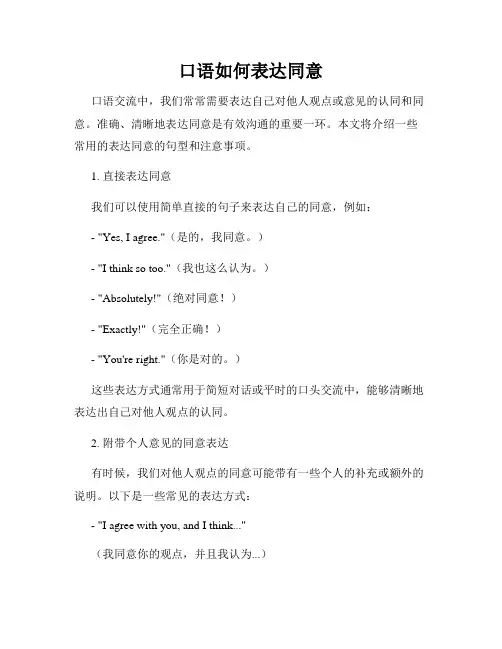
口语如何表达同意口语交流中,我们常常需要表达自己对他人观点或意见的认同和同意。
准确、清晰地表达同意是有效沟通的重要一环。
本文将介绍一些常用的表达同意的句型和注意事项。
1. 直接表达同意我们可以使用简单直接的句子来表达自己的同意,例如:- "Yes, I agree."(是的,我同意。
)- "I think so too."(我也这么认为。
)- "Absolutely!"(绝对同意!)- "Exactly!"(完全正确!)- "You're right."(你是对的。
)这些表达方式通常用于简短对话或平时的口头交流中,能够清晰地表达出自己对他人观点的认同。
2. 附带个人意见的同意表达有时候,我们对他人观点的同意可能带有一些个人的补充或额外的说明。
以下是一些常见的表达方式:- "I agree with you, and I think..."(我同意你的观点,并且我认为...)- "That's true, and in addition..."(没错,而且还有...)- "You're right, but I also believe..."(你说得对,但我还相信...)通过附加个人意见的方式,我们能够表达对他人观点的认可,同时提出自己的相关见解,丰富对话内容。
3. 引用他人观点来表达同意在口语交流中,我们也可以引用他人的观点来表达自己的同意,并加以赞同。
例如:- "As John said, I completely agree that..."(正如约翰所言,我完全同意...)- "Mary made a good point when she mentioned that..."(玛丽提到时说得很对,她说的...)通过引用他人的观点并展开表达,我们能够显示出对他人观点的重视和支持。
日常英语口语对话:意见和建议
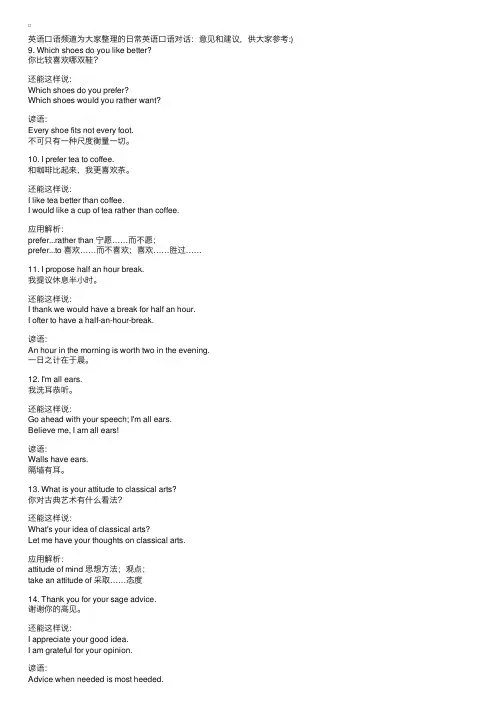
英语⼝语频道为⼤家整理的⽇常英语⼝语对话:意见和建议,供⼤家参考:) 9. Which shoes do you like better?你⽐较喜欢哪双鞋?还能这样说:Which shoes do you prefer?Which shoes would you rather want?谚语:Every shoe fits not every foot.不可只有⼀种尺度衡量⼀切。
10. I prefer tea to coffee.和咖啡⽐起来,我更喜欢茶。
还能这样说:I like tea better than coffee.I would like a cup of tea rather than coffee.应⽤解析:prefer...rather than 宁愿……⽽不愿;prefer...to 喜欢……⽽不喜欢;喜欢……胜过……11. I propose half an hour break.我提议休息半⼩时。
还能这样说:I thank we would have a break for half an hour.I ofter to have a half-an-hour-break.谚语:An hour in the morning is worth two in the evening.⼀⽇之计在于晨。
12. I'm all ears.我洗⽿恭听。
还能这样说:Go ahead with your speech; I'm all ears.Believe me, I am all ears!谚语:Walls have ears.隔墙有⽿。
13. What is your attitude to classical arts?你对古典艺术有什么看法?还能这样说:What's your idea of classical arts?Let me have your thoughts on classical arts.应⽤解析:attitude of mind 思想⽅法;观点;take an attitude of 采取……态度14. Thank you for your sage advice.谢谢你的⾼见。
用英文表达意见
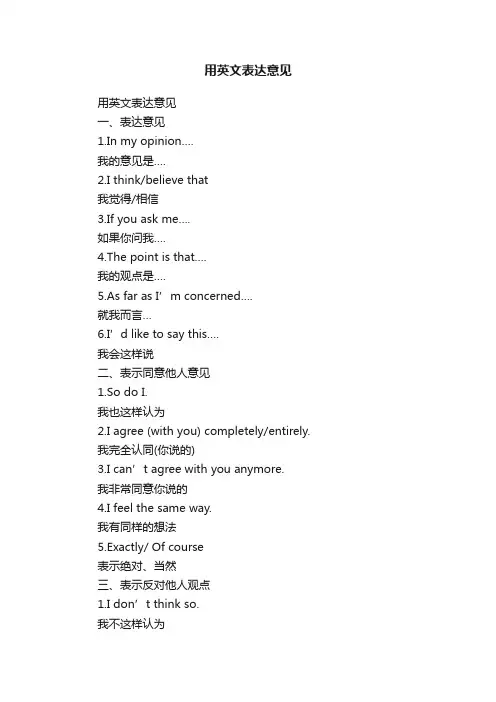
用英文表达意见用英文表达意见一、表达意见1.In my opinion….我的意见是….2.I think/believe that我觉得/相信3.If you ask me….如果你问我….4.The point is that….我的观点是….5.As far as I’m concerned….就我而言…6.I’d like to say this….我会这样说二、表示同意他人意见1.So do I.我也这样认为2.I agree (with you) completely/entirely. 我完全认同(你说的)3.I can’t agree with you anymore.我非常同意你说的4.I feel the same way.我有同样的想法5.Exactly/ Of course表示绝对、当然三、表示反对他人观点1.I don’t think so.我不这样认为2.I’m afraid I disagree.我恐怕不是这么想反对完总是要说出自己的想法或是反对的原因,那你可以这样讲: 1. I don’t like to disagree with you, but….我不喜欢反对你,但….2. All right, but don’t you think….好吧,但你不觉得….3. ……However…..然而 (这可举出你部分同意的地方,再表述你觉得不好的地方)4. But what about…..?但关于…..方面呢?四、总结你的观点不管是刚说完自己的意见或是反对完他人的意见,都可以总结一下,表示得更清楚。
1.What I mean to say was….我的意思是说….2.Let me repeat what I said….让我整理重申我刚讲的是….五、询问他人意见1.What do you think about?你觉得怎样?2.How do you see it?你怎么看?3.What’s your view on the matter?这件事你的看法如何?4.Let’s have your opinion.让我们听听你的意见六、总结讨论1.Basically we’re in agreement.基本上我们有共识2.I think we have agree to disagree. 我想我们有相同点与不同点3.I think we have different opinions. 我知道我们有歧见。
表达意见的短语
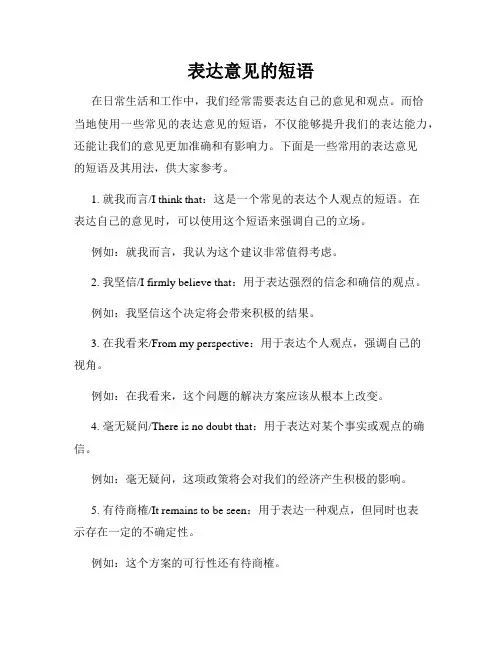
表达意见的短语在日常生活和工作中,我们经常需要表达自己的意见和观点。
而恰当地使用一些常见的表达意见的短语,不仅能够提升我们的表达能力,还能让我们的意见更加准确和有影响力。
下面是一些常用的表达意见的短语及其用法,供大家参考。
1. 就我而言/I think that:这是一个常见的表达个人观点的短语。
在表达自己的意见时,可以使用这个短语来强调自己的立场。
例如:就我而言,我认为这个建议非常值得考虑。
2. 我坚信/I firmly believe that:用于表达强烈的信念和确信的观点。
例如:我坚信这个决定将会带来积极的结果。
3. 在我看来/From my perspective:用于表达个人观点,强调自己的视角。
例如:在我看来,这个问题的解决方案应该从根本上改变。
4. 毫无疑问/There is no doubt that:用于表达对某个事实或观点的确信。
例如:毫无疑问,这项政策将会对我们的经济产生积极的影响。
5. 有待商榷/It remains to be seen:用于表达一种观点,但同时也表示存在一定的不确定性。
例如:这个方案的可行性还有待商榷。
6. 在某种程度上/To some extent:用于表达一种观点,在一定程度上说明问题。
例如:在某种程度上,这个计划能够解决一部分问题。
7. 根据我的观察/Based on my observation:用于表达观察所得的结论。
例如:根据我的观察,市场需求正在逐渐增长。
8. 据我所知/To the best of my knowledge:用于表达根据自己所知的信息进行判断。
例如:据我所知,这个项目已经完成了前期的准备工作。
9. 不容忽视/Cannot be ignored:用于强调某个事实或观点的重要性。
例如:这个问题的影响不容忽视,我们必须采取行动。
10.鉴于此/In view of this:用于引出一个相关的事实或观点。
例如:鉴于此,我们需要制定更加全面的措施来应对这个问题。
用英语提建议的表达方式
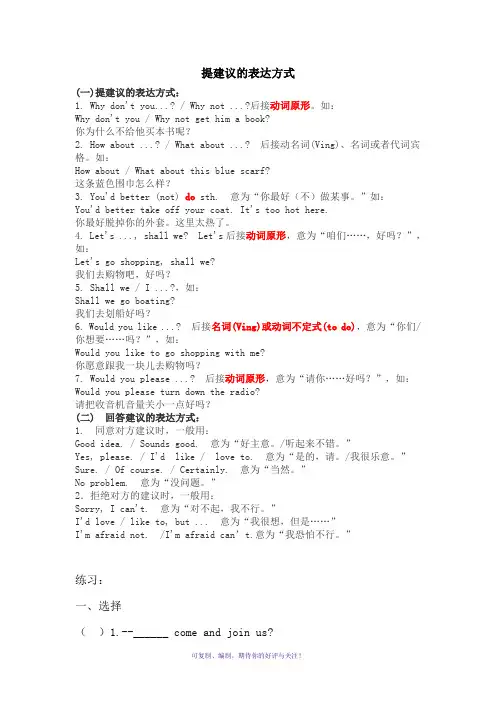
提建议的表达方式(一)提建议的表达方式:1. Why don't you...? / Why not ...?后接动词原形。
如:Why don't you / Why not get him a book?你为什么不给他买本书呢?2. How about ...? / What about ...? 后接动名词(Ving)、名词或者代词宾格。
如:How about / What about this blue scarf?这条蓝色围巾怎么样?3. You'd better (not) do sth. 意为“你最好(不)做某事。
”如:You'd better take off your coat. It's too hot here.你最好脱掉你的外套。
这里太热了。
4. Let's ..., shall we? Let's后接动词原形,意为“咱们……,好吗?”,如:Let's go shopping, shall we?我们去购物吧,好吗?5. Shall we / I ...?,如:Shall we go boating?我们去划船好吗?6. Would you like ...? 后接名词(Ving)或动词不定式(to do),意为“你们/你想要……吗?”,如:Would you like to go shopping with me?你愿意跟我一块儿去购物吗?7. Would you please ...? 后接动词原形,意为“请你……好吗?”,如:Would you please turn down the radio?请把收音机音量关小一点好吗?(二) 回答建议的表达方式:1. 同意对方建议时,一般用:Good idea. / Sounds good. 意为“好主意。
/听起来不错。
”Yes, please. / I'd like / love to. 意为“是的,请。
用英语提建议的表达方式
提建议的表达方式(一)提建议的表达方式:1. Why don't you...? / Why not ...?后接动词原形。
如:Why don't you / Why not get him a book?你为什么不给他买本书呢?2. How about ...? / What about ...? 后接动名词(Ving)、名词或者代词宾格。
如:How about / What about this blue scarf?这条蓝色围巾怎么样?3. You'd better (not) do sth. 意为“你最好(不)做某事。
”如:You'd better take off your coat. It's too hot here.你最好脱掉你的外套。
这里太热了。
4. Let's ..., shall we? Let's后接动词原形,意为“咱们……,好吗?”,如:Let's go shopping, shall we?我们去购物吧,好吗?5. Shall we / I ...?,如:Shall we go boating?我们去划船好吗?6. Would you like ...? 后接名词(Ving)或动词不定式(to do),意为“你们/你想要……吗?”,如:Would you like to go shopping with me?你愿意跟我一块儿去购物吗?7. Would you please ...? 后接动词原形,意为“请你……好吗?”,如:Would you please turn down the radio?请把收音机音量关小一点好吗?(二) 回答建议的表达方式:1. 同意对方建议时,一般用:Good idea. / Sounds good. 意为“好主意。
/听起来不错。
”Yes, please. / I'd like / love to. 意为“是的,请。
英语表建议的句型10种
1. "Why don't you…?":为什么不……?2. "You should…":你应该……3. "Could you…?":你能……吗?4. "How about…?":怎么样?5. "What if…?":如果……会怎么样?6. "Would it be helpful if…?":如果……会怎么样?7. "You might want to…":你可能想……8. "Why not…?":为什么不……?9. "You ought to…":你应该……10. "Give it a try, you won't regret it.":试一试,你不会后悔的。
11. "It's a good idea to…":做……是个好主意。
12. "You'd better do…":你最好做……13. "Let me suggest…":让我建议……14. "In my opinion, you should…":在我看来,你应该……15. "Consider doing…":考虑做……16. "Based on my experience, I recommend…":根据我的经验,我建议……17. "It's beneficial to…":做……有益处。
18. "It's high time to…":是时候做……了。
19. "You have nothing to lose by doing…":做……你没什么好失去的。
口语中的表达意见和反驳观点
口语中的表达意见和反驳观点口语交流是人们日常生活中不可或缺的一部分,而表达意见和反驳观点是口语交流中常常出现的情景。
无论是在学校、工作场合还是与朋友相处时,我们经常需要表达自己的看法或者对他人观点的反驳。
本文将探讨口语中表达意见和反驳观点的一些常用表达方式,以提升我们的口语交流能力。
表达意见:1. In my opinion/view, ...在我看来,…2. From my perspective, ...从我的角度来看,…3. I believe/think/consider that ...我认为…4. It seems to me that ...在我看来…5. Personally, I feel that ...个人而言,我觉得…6. As far as I'm concerned, ...就我而言…7. What I'm trying to say is ...我的意思是…8. I'm of the opinion that ...我持有的意见是…9. It's clear to me that ...对我来说很明显…10. From where I stand, ...从我的立场来看…反驳观点:1. I see what you're saying, but ...我了解你的观点,但是…2. I understand where you're coming from, but ...我理解你的观点,但是…3. That's one way to look at it, but ...那也是一种看法,但是…4. I get your point, but ...我理解你的观点,但是…5. I take your point, but ...我理解你的观点,但是…6. I hear what you're saying, but ...我听明白你的观点,但是…7. I can see why you think that, but ...我能理解你为什么这样认为,但是…8. I respect your opinion, but ...我尊重你的观点,但是…9. I don't entirely agree because ...我并不完全同意,因为…10. That may be true, but ...那可能是对的,但是…以上是口语中表达意见和反驳观点常用的表达方式,当然在实际交流中,我们还需根据具体情景和对话对象选择合适的表达方式。
英语表示建议的12个句型
英语表示建议的12个句型1. Shall we..?用Shall we..?表示建议或征求对方意见。
其肯定回答一般可用:All right. OK. Good idea 等。
2. Let’s..?Let’s..?表示“让我们(包括双方在内)做某事”的建议。
Let us 表示“让我们做某事”,不包括对方在内。
Let’s go to see the movie next Sunday, shall we?Let us go to the zoo tomorrow, will you?3. Why not...?Why not...?表示“为什么不……呢?”后接不带to的不定式(即动词原形)。
用来提出建议,该句型相当于Why don't you+动词原形…?(Why not…和Why don’t you…后面只能接动词原形)。
Why don’t you go there with me?Why don’t you try again?Why not try again?4.What about...? = How about...?What about...? = How about...? 意为“……怎么样?”后可接名词、的代词和动名词,用来向对方提出建议或征求对方的意见。
What/How about going boating today?(提建议)Good idea.What/How about this silk dress?(征求意见)What about going out for a walk after supper?I’m going to Hainan. What about you? (征求意见)5. 主语+ had better + do.主语+ had better + do. 表示建议“……最好做某事。
”常用于口语。
You had better stay at home and have a rest.6. 主语+ had better not + do.主语+ had better not+ do. 表示建议“……最好不做某事。
- 1、下载文档前请自行甄别文档内容的完整性,平台不提供额外的编辑、内容补充、找答案等附加服务。
- 2、"仅部分预览"的文档,不可在线预览部分如存在完整性等问题,可反馈申请退款(可完整预览的文档不适用该条件!)。
- 3、如文档侵犯您的权益,请联系客服反馈,我们会尽快为您处理(人工客服工作时间:9:00-18:30)。
英语口语技巧:13种表达意见的方式In life we’re often asked to give our opinion, or in some cases, we give our opinion even if it hasn’t been asked for!生活中,经常有人会询问我们的意见,或者在某些情况下,即使没有被询问,我们也会给出自己的意见。
Sometimes we can be very direct with our opinion and it won’t upset the other person. However, more often than not we need to be careful how we share our thoughts so as not to offend or hurt the other person’s feelings. This can be especially true in business where cultural differences can have adetrimental effect on business dealings.有时我们可以非常直接地表达我们的意见,且不会让别人不开心。
但是,为了不伤害或冒犯到他人,我们通常需要小心翼翼的分享我们的想法。
这在商界尤其重要,因为文化差异可能会对交易产生不利影响。
The British are especially careful when giving their opinion (in business, that is). They often don’t want to cause offence and consequently, will start their sentences using certain expressions to soften the blow. A number of my clients have said that the British are very polite and considerate in their dealings with colleagues and clients. So much so, that the British way of doing business is often admired.英国人在表达自己的意见时特别小心(在商界)。
他们通常不想冒犯别人,所以开始会使用一些特定的表达来缓和接下来的内容。
我的顾客中有很多人都说过英国人在和同事及顾客处理问题时都非常地礼貌和体贴。
所以,英国人做生意的方式通常都是令人钦佩的。
In this post, I’d like to share with your some common expressions we have of giving one’s opinion. I have used Liz Potter’s excellent article f or Macmillan Dictionary’s blog as the main structure and made some changes to it.在这篇文章中,我想分享一些在表达意见时会用到的常用词组。
我用Liz Potter 为麦克米伦字典的博客写的一篇优秀文章作为主要结构,并做了一些改动。
1. I thinkThis is the most common and general way of giving an opinion. You can use it both informally and formally: I think if you offer a consistently good service to your clients, they will keep coming back to you.这是最常用、最普遍的表达意见的方式,正式和非正式情况下都可以使用:我认为如果你给客户提供始终如一的优质服务,他们会一直选择你们的服务。
2.I reckonThis is a more informal way of giving your opinion: I reckon it will be much faster to get to London by train.一种更加非正式的表达意见的方式:我认为坐火车去伦敦会更快。
3. In my opinion (4) In my viewThese expressions are more formal and are often used when talking about important issues:In my view, they made a huge mistake in not selling the company when they had the chance.In my opinion, the Bank of England should not raise interest rates this year.这两个表达更加正式,并且通常在谈论重要问题时使用:在我看来,当他们有机会卖掉公司时却不卖是个重大的错误。
在我看来,英国银行今年不应该增加利息。
5. It seems to me (6) All things consideredWhen you’ve thought about a situation carefully you could use either of these two expressions:It seems to me that they are spending more money than they need to to attract new talent into the company.All things considered, I think we made a wise choice in recruiting James.当你已经仔细考虑过一种情形时,你可以使用两种表达中任意一种:在我看来,在为公司引进新人才时,他们的花费比实际需求多很多。
总的来看,我认为招聘詹姆斯是一个明智的选择。
7. If you ask meThis is used when your opinion is critical. Sometimes, people say this even when their opinion hasn’t been asked for! –“If you ask me,…..” “But I didn’t ask you….!”If you ask me, she has spoilt her children far too much.当你的意见带有批评性质的时候使用这种表达。
有时,人们甚至会在没有被询问意见的时候使用这个短语!-“依我看…”“但是我没有问你…”!依我看,她太过溺爱她的孩子了。
8. To be honest (9) To tell you the truth (10) To be frank:All three expressions are a way of giving your opinion when you know that people may not like what you have to sayTo tell you the truth, your father was right when he said that you undersold the company.To be honest, I preferred it when you were blonde.To be frank, I thought her acting was simply terrible.知道别人可能不喜欢你要说的话时,可以用这三种表达来给出你的意见:老实告诉你,你父亲对你低价抛售公司的判断是对的。
老实说,我更喜欢你金发的样子。
坦白地说,我觉得他的表演很糟糕。
11. Frankly speakingYou would use this expression to give your opinion in a more familiar and forthright way.Frankly speaking, I don’t know what she sees in him.这是一种更亲近和直率的表达意见的方式:坦白地说,我不知道她看上他哪一点。
12. PersonallyThis is used to emphasize that you are giving your own opinion: Personally, I think the CEO should apologize for his appalling behaviour at the shareholders’ meeting.这个短语通常用来强调你说的只是个人意见:就我而言,我认为总裁应该为他在董事会的恶劣行为道歉。
13.As far as I’m concernedWhen you realise that other people may not agree with you you would use either of these expressions:To my mind, private education is better than state education.As far as I’m c oncerned, tennis is a much more interesting sport than football.当你意识到其他人可能不同意你的观点时,可以使用这两种表达中的任意一种:依我看,私立教育比公立教育好。
就我而言,网球比足球有意思多了。
So there you have it! You have 14 ways to give your opinion in English. Which expressions are you likely to use?都学会了吧!一共14种用英语表达意见的方式,你喜欢用哪一种呢?。
